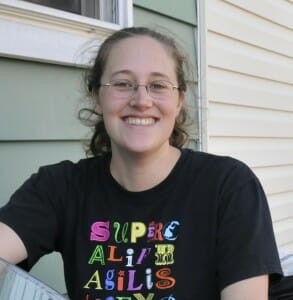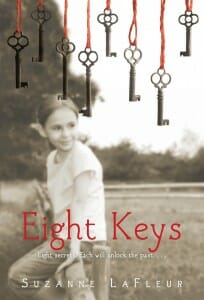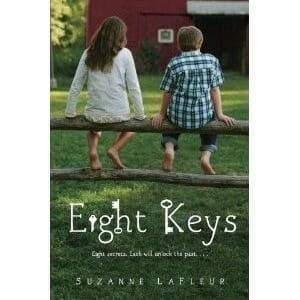
Some children know their future career path while others are clueless. Individuals who know where they are headed can get a jump start on mastering certain skills and plan accordingly. Children’s author, Suzanne LaFleur, falls into this category. From an early age, Suzanne took steps to become an accomplished writer. Her focus on children’s literature has paid off. Within a handful of years, she has traditionally published 3 chapter books- Eight Keys, Listening for Lucca, and Love, Aubrey. Her books have been well received by students and teachers. Simultaneously, she has received impressive starred reviews from Booklist and Publishers Weekly.
Suzanne sent me a copy of Eight Keys in exchange for this interview and an honest review. She is participating in a book giveaway that is limited to American and Canadian readers. See below for details.
Welcome Suzanne.
When you were a child, you boldly expressed your desire to write children’s books. Why did you set this goal at such an early age?
I loved reading and writing, and I discovered that a lot of adults didn’t consider children’s books to be true literature, which made me really mad, but also really determined to prove them wrong.
As you matured into adulthood, did your outlook on being a children’s author change? Did you ever consider pursuing an alternative career path?
My primary goal was always to be a children’s book author. My other interest, which I’ve been doing in usually part-time capacities for 13 years now, was teaching. I currently teach math lessons to private students.
What steps did you take during childhood and later as an adult to fulfill your dream to become a children’s author?
I read A LOT. And spent as much time writing. With the help of my parents, I started gearing my formal education towards this goal as early as middle school, when they selected a school for me that offered two periods of English a day for seventh graders. In college I majored in English and History, focusing full-time on story, literary analysis, and creative thinking and writing endeavors. Then I went to grad school, attaining an MFA in Writing for Children from The New School in New York City.
Many children’s authors are comparing the pros and cons of traditional publishing with self-publishing. How did you find an agent that helped you navigate the traditional publishing world? Have you used the same agent for all of your books?
I found my agent through connections I made at The New School, and she has been the agent for all of my books. I have to admit I love having her in my life. Not only were there the obvious elements of agenting—she knew which editors would take interest in my work, made sure all the fine print of the contracts was fair—but I was surprised at how well she got to know me so quickly. I remember once early on she called me and said, “I’m going to tell you everything. Then I’m going to tell you everything again. Then you can ask questions.” She’d already picked up on how I liked to think through my decisions. And at the release party for my first book, she found me doing something I like to do—serving cake—instead of something I don’t like to do—socializing—and she sent me back to talk to my guests while she gave out cake. She knew just the nudges I needed to get through the party. Towards the end of the party, she, my editor, and I, all ended up picking at that cake together anyway, and it was a sign to me of how well matched we all were to work together.
What prompted you to focus your attention on middle level chapter books? Do you have any plans to expand your writing to include other genres or age levels?
I write following the voice of a narrating character, and so far my published books have featured characters who are 11-12 and 13. It wasn’t so much a deliberate choice as just what happened. My imagination seems to focus on this age range for thematic reasons having to do with learning about yourself and growing up—or, maybe my imagination just has the voice of a twelve-year-old. I have been working on a change-of-pace fantasy piece narrated by a fourteen-year-old, which would end up being on the younger end of teen books, but I think there’s still a lot left to do there before publication! At the same time, I’m working on an alternate-history middle grade book, back in more-familiar territory with a twelve-year-old narrator.
Every author follows a set routine when creating a novel. Can you share 5 key aspects of your method?
We don’t necessarily have a set routine! Writing books is like raising kids in that sense—maybe you’ve done it before, but your second kid has totally different needs than your first, and will require individualized attention and new strategies. By your third, you may feel like an old pro, but then you discover this one has a totally different personality than either of the first two!
But I can answer your question, at least in a general sense, about what I usually tend to do when I write a book (I often describe this sequence to kids as my “writing process” when they ask):
–I let the story find me and then think about it for a long time. Sometimes years (though this last time, it was only a few days).
–I write everything I’m already seeing/hearing first, without worrying about where it goes. As I write, more and more scenes come to light.
–I figure out what order the scenes belong in and usually struggle to write the missing scenes I hadn’t envisioned ahead of time.
–When things feel put together enough, I’ll ask a couple trusted friends to read for me (I actually skipped this stage for Eight Keys and went right to my editor).
–I never, ever outline. I don’t believe in it. As far as I can tell, outlines are for existing texts, so I’ve never understood why school teachers and other authors insist you should outline before you know the content of something. That’s why I go for putting things in order only after you’ve done most of the writing already.

I recently read your second book, Eight Keys. The main character, Elise, struggles with a variety of relationship issues. (She is an orphan who is being raised by her childless aunt and uncle. Elise’s status as an only child is toppled when a relative moves in with a baby. Peer pressure is making her question a long-time relationship with her best friend. A classmate bullies her on a daily basis.) Did you draw upon any of your own experiences when you created these scenarios or is everything fiction?
It’s almost entirely fiction. I only used small touches from my own life. In the book, Elise’s hand gets regularly slammed in her locker by the bully—this event actually happened to my best friend, but only once. Elise also has trouble adjusting to the increased work level and expectations in middle school, and I had trouble with that, too. She eats rainbow-streaked M&M ice cream; I used to get that flavor because I thought it was pretty.
The discovery of the mysterious keys is an added dimension to this story. Can you explain the significance?
The keys play on two meanings of the word—Elise finds physical keys, but they each come attached to an important bit of advice. As a “key” idea is one at the heart of an issue, Elise ends up with eight physical keys but also eight pieces of wisdom.
Eight Keys is filled with engaging dialogue. Can you provide 3 tips for creating an effective and moving dialogue?
–Listen to the natural voices of your characters as they interact in your imagination rather than trying to tell them what to say.
–Avoid letting them address each other by name every line. I don’t know why, but people often write that way though nobody talks like that.
–Read what you wrote out loud. Are the inflections clear? Does the word choice sound natural for speech rather than writing? Is each speaker identifiable if unlabeled?
Readers of novels usually gain some insight about life. What do you hope your audience learns from Eight Keys?
That you can build the self you wish to be.

Book Giveaway:
Anyone who leaves a comment on this blog by Sunday, July 20 will be eligible for a book giveaway. Suzanne will send the randomly selected American or Canadian winner an autographed copy of Eight Keys.
Question to Blog Readers:
When you were a child, did you recognize your future career path? If so, share your experience and be eligible for a copy of Eight Keys.
Related Blogs:
Sandra’s Bio
This interview intrigued me. How wonderful to embrace a passion and design a career path to bring it to fruition! Eight Keys sounds like a wonderful book, one I will definitely read.
Gayle, If you read Eight Keys, I’d love to hear your feedback.
Lovely interview! I enjoyed reading about Suzanne’s background and writing process, as well as hearing more about her newest middle grade book. Thanks, ladies!
Jessica,
Thanks for stopping by and commenting. Eight Keys is Suzanne’s 2nd book. Listening for Lucca is Suzanne’s latest book.
As a longstanding fan, I am always fascinated to hear more details on Suzanne’s writing inspiration and process. Thank you for sharing!
Stenie,
Thanks for stopping by.
Loved the article. Nice to see the insight involved in getting to be a published author! I admire anyone with that much creativity. Thanks loads!
Nancy, I agree that is interesting to see what steps authors took to fulfill their dream.